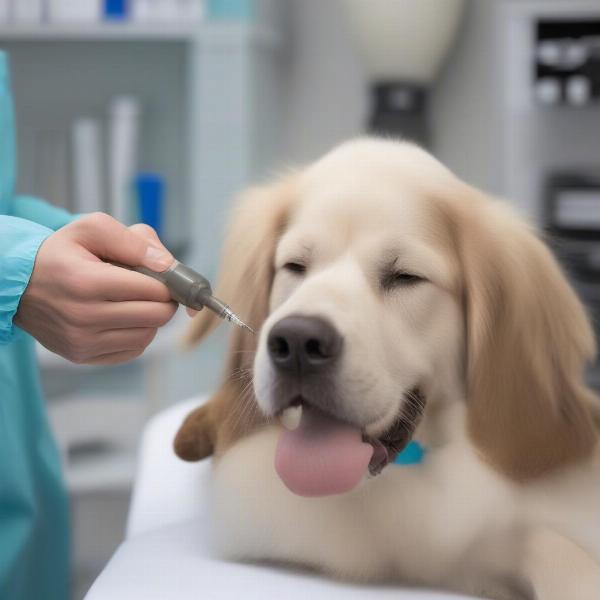Accuplex for dogs is a commonly used term referring to the Accuplex4 canine coronavirus, parvovirus, and distemper virus antigen test. This rapid diagnostic test helps veterinarians quickly identify these potentially life-threatening infections in dogs. Understanding this test, its uses, and its limitations can be vital for dog owners.
Understanding the Accuplex Test for Dogs
What exactly does Accuplex test for in dogs? The Accuplex4 test simultaneously detects the presence of canine parvovirus, coronavirus, and distemper virus antigens in fecal samples or other bodily fluids. These three viruses pose serious threats to dogs, especially puppies, and early detection is crucial for effective treatment. The test offers a rapid, in-clinic result, aiding veterinarians in making timely decisions. While effective, it’s important to remember that no test is perfect. False negatives or positives can occur, and further testing might be necessary to confirm the diagnosis.
Why is Accuplex Testing Important?
Early detection of parvovirus, coronavirus, and distemper is critical for managing these diseases effectively. These viruses can spread rapidly, and early intervention can significantly improve a dog’s chances of recovery. Accuplex allows for quick identification, allowing treatment to begin sooner rather than later. This quick diagnosis can be lifesaving, especially in vulnerable populations like puppies and senior dogs.
 Dog Receiving Veterinary Care
Dog Receiving Veterinary Care
How the Accuplex Test Works
The Accuplex test is a lateral flow immunoassay. A small sample of feces or other fluid is mixed with a reagent solution and then placed on the test device. As the sample flows across the device, it reacts with specific antibodies. If antigens from the targeted viruses are present, a visible line appears indicating a positive result. The test is relatively simple to perform and provides results within minutes.
Interpreting Accuplex Results
Understanding how to interpret the Accuplex test results is crucial. A positive result indicates the presence of viral antigens, suggesting infection. However, a negative result doesn’t necessarily rule out infection. False negatives can occur, especially in the early stages of the disease. If a dog exhibits symptoms consistent with these viral infections despite a negative Accuplex result, further testing might be required. Always consult with your veterinarian to discuss test results and the best course of action for your dog.
Limitations of the Accuplex Test
While Accuplex provides a valuable tool for rapid diagnosis, it’s essential to understand its limitations. Like any diagnostic test, Accuplex is not foolproof. False negative results can occur if the viral load is low, particularly in the early stages of infection. False positives can also happen, although less frequently. Therefore, your veterinarian might recommend additional confirmatory tests, such as PCR, for a definitive diagnosis.
Conclusion
Accuplex for dogs is a rapid and useful diagnostic test for detecting canine parvovirus, coronavirus, and distemper. While it offers quick results and aids in timely treatment, it’s important to understand its limitations and the possibility of false results. Always consult your veterinarian to interpret the test results and determine the best course of action for your dog’s health. Early detection and appropriate veterinary care are crucial for managing these potentially devastating viral infections.
FAQ
- How accurate is the Accuplex test? While highly effective, Accuplex is not 100% accurate and false results can occur.
- What should I do if my dog tests positive for one of these viruses? Contact your veterinarian immediately to discuss treatment options.
- Can I administer the Accuplex test at home? While some versions are designed for home use, always consult with your veterinarian before using any at-home test.
- What samples are used for the Accuplex test? Fecal samples are most common, but other fluids may be used.
- How long does it take to get Accuplex results? Results are typically available within minutes.
- Can a vaccinated dog still test positive? In some cases, vaccinated dogs may test positive due to residual vaccine antigens, not active infection.
- What are the symptoms of parvovirus, coronavirus, and distemper? Symptoms vary, but can include vomiting, diarrhea, lethargy, and respiratory issues. Consult a veterinarian if your dog exhibits any of these signs.
About ILM Dog: ILM Dog is your trusted source for comprehensive, expert advice on dog care and well-being. We cover everything from breed selection and health to training, nutrition, and grooming. We strive to empower dog owners worldwide with the knowledge they need to provide the best possible care for their furry companions. For expert guidance on dog health, breeds, training, nutrition and more, contact us at email: [email protected] or phone: +44 20-3965-8624.